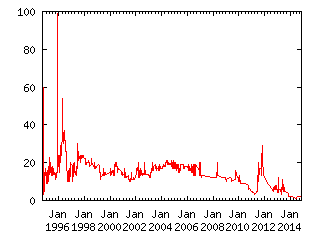I got a very good comment on this
article“Cold fusion cannot be confirmed by a popularity context, or by politics, and not even by asking experts. There is only one way to confirm that it exists: by experiment…. Objective, replicated instrument readings are the one and only standard of truth in experimental science.”
This is correct, if everyone in the world thinks the world is flat it is still not. The only standard of truth is experimental science. However prediction markets do provide scientists with publicity, understandability and money. All these are useful.
Prediction markets give the public a readable figure on how likely *people think* a certain event is*.
They provide a method to clear FUD from scientific debates. For example when
climate change
skeptics are asked to bet on their prediction they suddenly become less supportive of their criticisms.
""
Richard Lindzen says he's willing to take bets that global average temperatures in 20 years will in fact be lower than they are now." (thanks to William Connolley for the tip). Given his widely-promulgated views, I took this quote at face value and contacted him to arrange a wager. A payoff at retirement age would be a nice top-up to my pension.
Now here's the kicker. Richard Lindzen will indeed accept a bet - but only if offered odds of 50:1 in his favour!"
Another advantage of prediction markets is they provide a way for scientists to make money by being right. Being right is something we should encourage scientists to be. If the market is inaccurate you can make money betting against it.
The scientific method does change over
time That talk gives the following additions to the scientific method over time.
2000 BC - First text indexes
200 BC - Cataloged library (at Alexandria)
1000 AD - Collaborative encyclopedia
1590 - Controlled experiment (Roger Bacon)
1600 - Laboratory
1609 - Telescopes and microscopes
1650 - Society of experts
1665 - Repeatability (Robert Boyle)
1665 - Scholarly journals
1675 - Peer review
1687 - Hypothesis/prediction (Isaac Newton)
1920 - Falsifiability (Karl Popper)
1926 - Randomized design (Ronald Fisher)
1937 - Controlled placebo
1946 - Computer simulation
1950 - Double blind experiment
1962 - Study of scientific method (Thomas Kuhn)
There is a big push at the moment to have papers properly blinded so reviewers do not know who they are
reading.
An mp3 talk on how the scientific method has changed is
here.
So it might be odd but it is not heretical to suggest that the
funding of science or even some elements of the scientific method can be altered to take markets into
account. This will not alter the place of experiments but could alter the rewards and incentives available to scientists.
*edit. As Dunc correctly pointed out.



